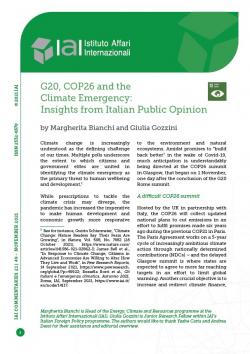G20, COP26 and the Climate Emergency: Insights from Italian Public Opinion
Climate change is increasingly understood as the defining challenge of our times. Multiple polls underscore the extent to which citizens and government elites are united in identifying the climate emergency as the primary threat to human wellbeing and development.[1]
While prescriptions to tackle the climate crisis may diverge, the pandemic has increased the imperative to make human development and economic growth more responsive to the environment and natural ecosystems. Amidst promises to “build back better” in the wake of Covid-19, much anticipation is understandably being directed at the COP26 summit in Glasgow, that began on 1 November, one day after the conclusion of the G20 Rome summit.
A difficult COP26 summit
Hosted by the UK in partnership with Italy, the COP26 will collect updated national plans to cut emissions in an effort to fulfil promises made six years ago during the previous COP21 in Paris. The Paris Agreement works on a 5-year cycle of increasingly ambitious climate action through nationally determined contributions (NDCs) – and the delayed Glasgow summit is where states are expected to agree to more far reaching targets in an effort to limit global warming. Another crucial objective is to increase and redirect climate finance, as well as to finalise certain pending details of the Paris regime.[2]
Success on all these aspects is by no means a given, however. The mismatch between rhetoric and concrete commitments is clear.[3] Moreover, lingering mistrust between states at different levels of development, disagreements on burden sharing and solidarity as well as the lack of ambitious climate targets coming from a number of emerging economies – not to mention the recent revival of international geopolitical tensions and recriminations – could well undermine the summit’s multilateral objectives.
The G20 summit concluded in Rome was an important test for the climate, gathering states responsible for about 80 per cent of global emissions and some of the biggest coal producers and consumers. The summit delivered mixed results: on the bright side, it reaffirmed the spirit of Paris, recognised climate security implications and the need to accelerate action to keep the objective of a 1.5°C increase within reach.
It also elevated the urgency of a global coal phase out. Encouragingly, leaders agreed to end overseas coal plant finance following on from similar commitments by the G7, the OECD and many Asian countries. Frequently overlooked issues, such as the importance of reducing methane emissions, were also recognised by the G20 for the first time.
Yet, wide delivery gaps remain. The G20 produced no real breakthrough on climate finance, no agreed end for fossil fuel subsidies and some resistance on explicit wording related to coal. COP negotiations in Glasgow must now deliver much clearer decisions on many of these aspects.
Italy and the climate emergency
Italy is playing an important role in European and global efforts to tackle the climate emergency. As the co-chair of COP26 and holding the G20 Presidency for 2021, Italy joined a growing chorus of actors calling for increased environmental commitments, including in the domain of climate finance. Moreover, in October, Italy hosted the Pre-Cop and the Youth4Climate meetings in Milan, paving the way for the Glasgow summit.
In the run up to Glasgow, Prime Minister Mario Draghi reiterated support for the Green Deal, committing Italy to achieve a 55 per cent reduction in carbon emissions by 2030 and net-zero emissions by 2050.[4] The Italian government’s activism is mirrored by the growing concern about climate change registered among the general public.
A recent survey commissioned by the Italian Foreign Policy programme of the Istituto Affari Internazionali (IAI) with the support of the Compagnia di San Paolo Foundation underscores how a majority of Italian respondents believe climate change to be the primary threat to national security.
The survey, carried out by the Laboratory for Political and Social Analyses (LAPS) within the Department of Social, Political and Cognitive Sciences at the University of Siena, was conducted between 2–10 September 2021. It involved a sample of 2,049 individuals of Italian nationality aged eighteen and above and covers a number of salient themes connected to Italian foreign policy, perceptions of the Italian government’s handling of key dossiers and relations with third states and leaders.
The complete survey report will be published in the coming weeks and presented at a public debate in Rome on 15 November 2021.[5] What follows is a preview of the survey’s results pertaining to the climate emergency and the Italian government’s handling of the crisis.[6]
Italian popular opinion and the climate emergency
Survey results demonstrate how a clear majority – 89 per cent – believe the climate emergency to be the number one threat to national security, followed by pandemics (85 per cent) and cyber-attacks (70 per cent). Significantly, migratory flows towards Italy and Europe, which have traditionally topped Italian concerns, receive 60 per cent of preferences, ranking in fourth place (Figure 1).
Figure 1 | Ranking of threats to Italian national security (%)
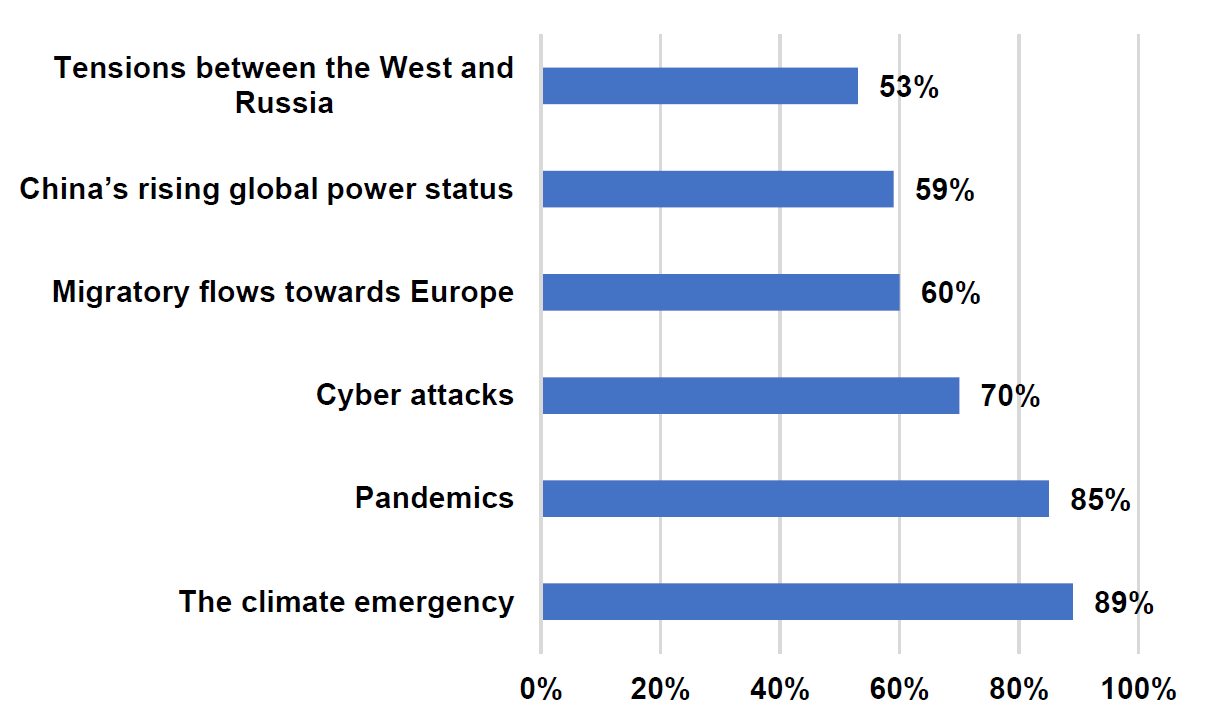
Source: IAI-LAPS survey 2021 (translation by the authors).
Compared to 2020, when 84 per cent of the poll chose the climate emergency as the number one threat, the 2021 survey records a 5 per cent increase in the perceived threat from climate change. This perception is shared across the sampled population, regardless of age and political orientation, thus highlighting the homogeneity of these concerns in Italy.
Economic costs and the green transition
The survey also addressed the crucial relationship between economic growth and the energy transition. Faced with the trade-off between environmental protection and economic growth, 48 per cent of Italians prioritise the fight against climate change, while 22 per cent opt for the need to maximise economic growth, even to the detriment of environmental policies (Figure 2).
Figure 2 | Climate change and economic growth
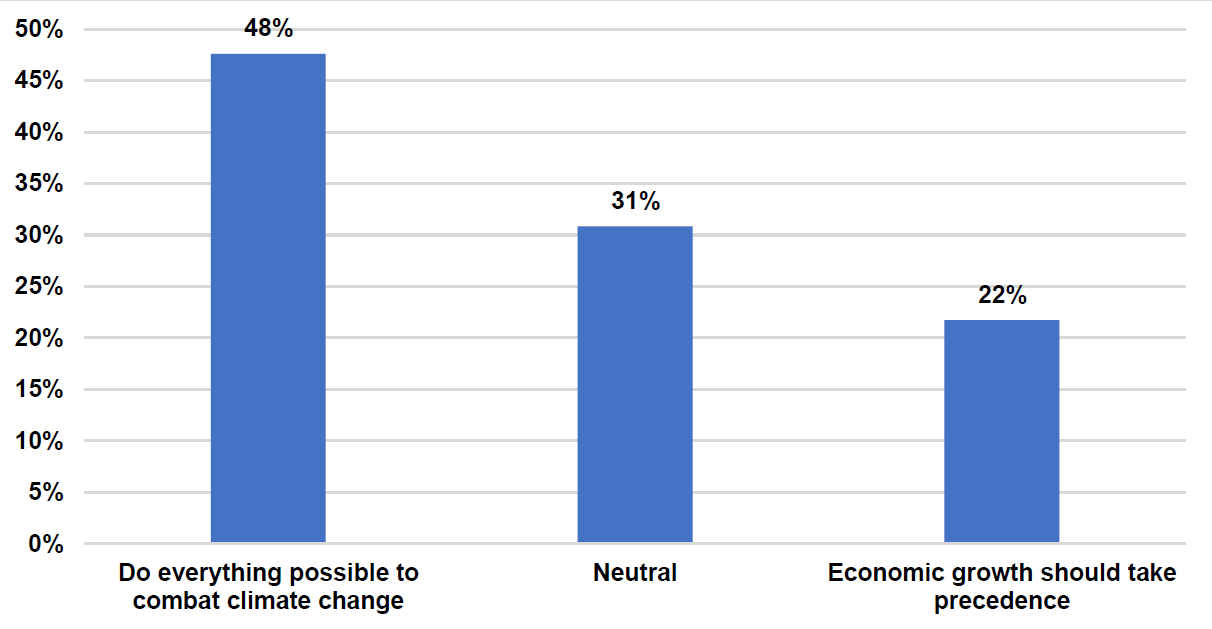
Source: IAI-LAPS survey 2021 (translation by the authors).
The issue is highly relevant: GDP growth has historically been associated with rising greenhouse gases emissions. Reversing this trend will not be easy although decoupling is possible if sustained by massive investments in technologies and infrastructures.[7] Still, the long-term environmental, social and economic benefits of the transition undoubtedly outweigh initial costs. This message underpins the “green growth” agenda promoted by the EU, but could perhaps benefit from clearer communication in order to better frame the advantages of such a vision. In this regard, climate action undoubtedly comes with a cost, but carrying on with a business as usual approach is certain to imply even further burdens in the near future.
The debate on environmental sustainability in Italy is often polarised. Whilst it is difficult to find climate change deniers among the major parties, political orientations do matter. Survey results show how the electorate of the centre-left Democratic Party (Partito Democratico – PD) and the populist and formerly anti-establishment Five Star Movement (Movimento 5 Stelle – M5S) tend to classify the fight against climate change as a priority over economic needs. Such viewpoints are less defined among right and centre-right parties – albeit with slight differences within each electorate (Figure 3).
Figure 3 | Climate change and economic growth by political orientation
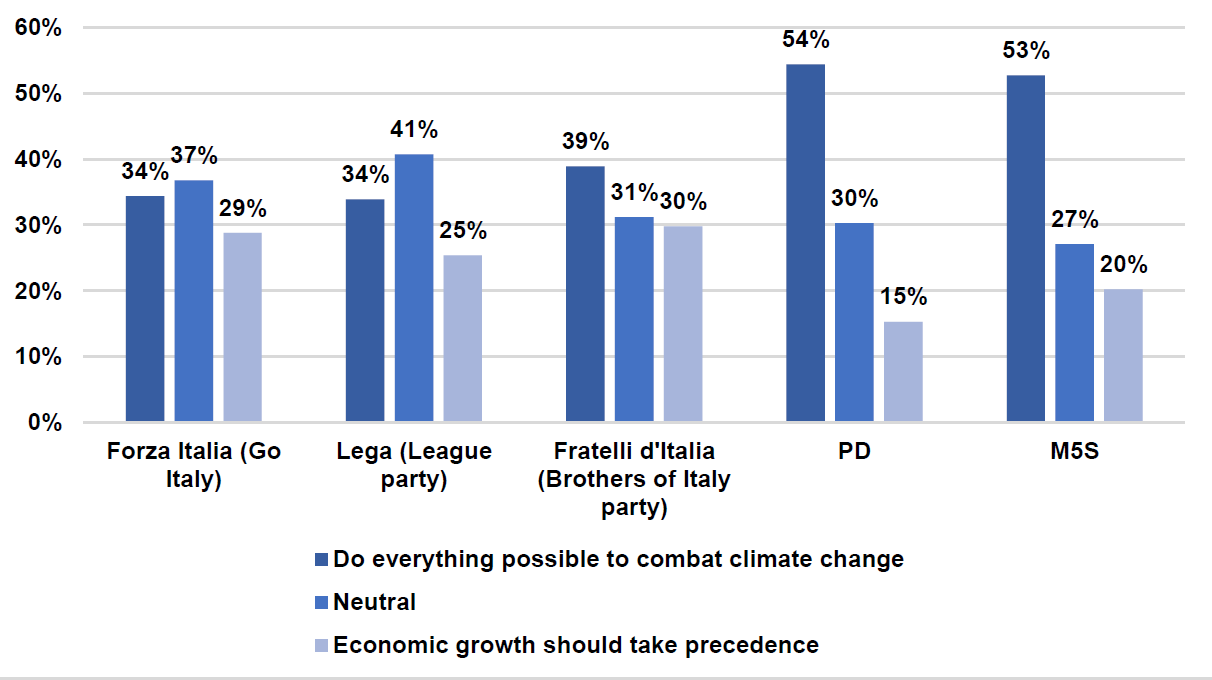
Source: IAI-LAPS survey 2021 (translation by the authors).
EU policy and the climate emergency
Many respondents enthusiastically back more robust EU action on climate change. When asked “What should the EU do on environmental issues?”, a large majority – 80 per cent – call for EU sanctions on national governments, including Italy, for violations in European environmental regulations. Within the EU, Italy is among the states with the highest number of violations of EU environmental laws and consequently has had to pay significant fines (about 500 million euro as of 2018).
To better gauge popular opinion on this issue, the above question was posed to a smaller sub-sample of respondents, adding the reference to fines imposed on Italy as of 2018, to test whether perspectives change. Results do not shift substantially, with a large majority – 72 per cent – again supporting EU fines on states violating environmental rules.
Taking into consideration the political orientation of respondents, the most favourable views emerge among the electorate of the PD (ranging from 90 per cent in favour when the question was posed without further information to 87 per cent with information). Among centre-right voters, viewpoints are more diffused, with the highest change being registered among the Go Italy electorate (Forza Italia – FI): 81 per cent are in favour of EU sanctions, but this percentage declines to 63 per cent when respondents are supplied with the above information on the extent of fines paid by Italy. League party voters are the least enthusiastic backers of greater EU action on the environment (Figure 4).
Figure 4 | Fines for violations of EU environmental norms by political orientation (% favourable)
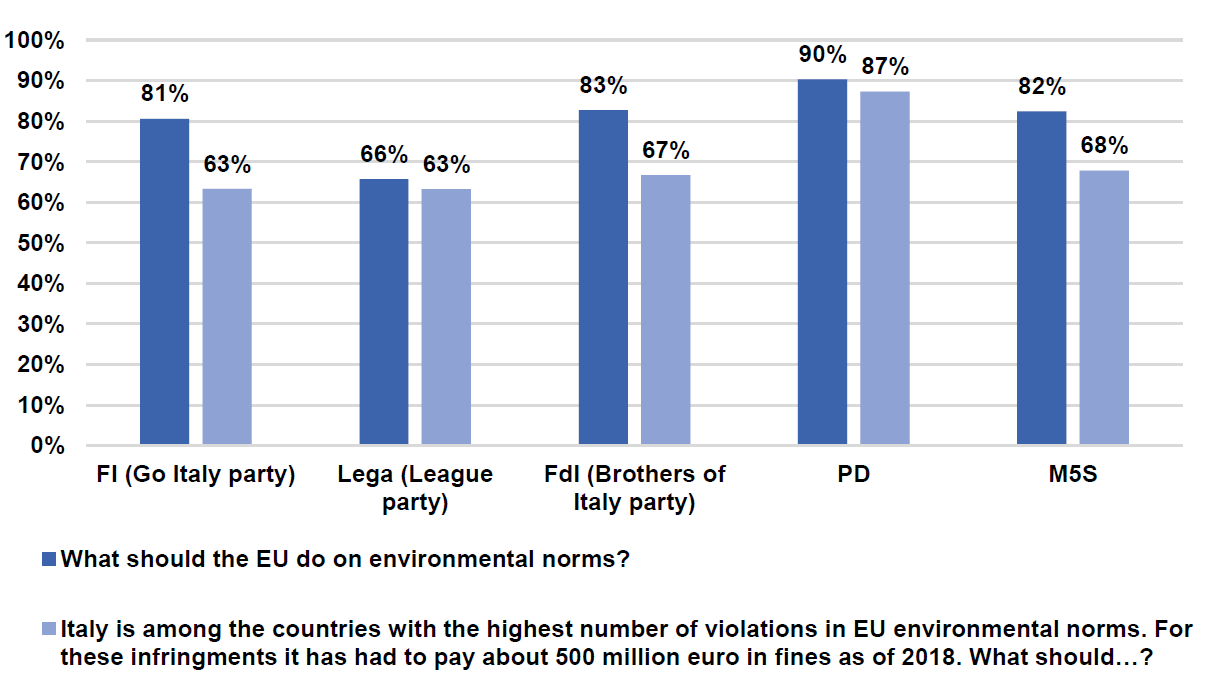
Source: IAI-LAPS survey 2021 (translation by the authors).
While EU legislation is considered important for the fight against climate change, Italian citizens are somewhat less convinced regarding the impact that civil society initiatives may have in spurring more ambitious action by national governments. When asked about the effectiveness of legal complaints filed by groups of private citizens and civil society organisations against the Italian government for its lack of action in tackling climate change, a large majority – 85 per cent – believe such actions to be useful to raise awareness, but only 42 per cent find such measures effective to influence political decisions.
Climate change and multilateral action
In light of Italy’s G20 presidency, respondents were also asked to reflect on the key priorities of international multilateral bodies. When asked about the G20 agenda, a majority – 36 per cent – identifies climate change as the main priority, followed by regulating migratory flows (21 per cent), the international distribution of Covid-19 vaccines (17 per cent) and the fight against poverty (12 per cent). Countering international terrorism and coordinated action on the taxation of multinationals receive less than 10 per cent of preferences.[8]
The survey data clearly reflects growing citizen awareness about the multidimensional threats of climate change, with Italian citizens demanding more concerted action from the national government as well as multilateral organisations. While political sensitives do translate into slight divergences among the general public, solid majorities are in favour of more action to tackle the climate emergency. Encouragingly, prime minister Draghi strongly underscored the importance of multilateral cooperation on climate in his G20 opening speech.[9]
Through a mushrooming of international activism and bottom-up pressure to tackle the climate emergency, as well as the many sectoral campaigns running in parallel with the COP,[10] an increasing number of actors are sending resounding signals that time is running out to accelerate towards a more inclusive and resilient economy. As all eyes shift to the COP26 negotiations in Glasgow, the climate emergency is sure to continue to top the international agenda for months and years to come.
Margherita Bianchi is Head of the Energy, Climate and Resources programme at the Istituto Affari Internazionali (IAI). Giulia Gozzini is Junior Research Fellow within IAI’s Italian Foreign Policy programme. The authors would like to thank Yeshe Carta and Andrea Dessì for their assistance and editorial overview.
[1] See for instance, Quirin Schiermeier, “Climate Change: Nature Readers Say Their Fears Are Growing”, in Nature, Vol. 598, No. 7882 (28 October 2021), https://www.nature.com/articles/d41586-021-02862-3; James Bell et al., “In Response to Climate Change, Citizens in Advanced Economies Are Willing to Alter How They Live and Work”, in Pew Research Reports, 14 September 2021, https://www.pewresearch.org/global/?p=49922; Rossella Borri et al., Gli italiani e l’emergenza climatica. Autunno 2021, Rome, IAI, September 2021, https://www.iai.it/en/node/14117.
[2] For an overview on the COP26 see Margherita Bianchi, “Towards COP26: Detangling the Knots of Climate Negotiations”, in IAI Papers, No. 21|25 (June 2021), https://www.iai.it/en/node/13564.
[3] United Nations Environment Programme (UNEP), Emissions Gap Report 2021: The Heat Is On – A World of Climate Promises Not Yet Delivered, Nairobi, UNEP, 2021, https://www.unep.org/node/30308.
[4] Italian Government, Prime Minister Draghi’s Remarks to UN Climate Roundtable, 20 September 2021, https://www.governo.it/en/node/18006.
[5] For more details see IAI website: https://www.iai.it/en/node/14276.
[6] Rossella Borri et al., Gli italiani e l’emergenza climatica, cit.; For other previews see, Gianluca Piccolino et al., Gli italiani e l’immigrazione. Autunno 2021, Rome, IAI, October 2021, https://www.iai.it/en/node/14207; Gianluca Piccolino et al., Gli italiani, il G20 e la cooperazione internazionale. Autunno 2021, Rome, IAI, September 2021, https://www.iai.it/en/node/14127; Davide Angelucci et al., Afghanistan, missioni all’estero e spese militari: le opinioni degli italiani, Rome, IAI, September 2021, https://www.iai.it/en/node/14100.
[7] Klaas Lenaerts, Simone Tagliapietra and Guntram B. Wolff, “Can Climate Change Be Tackled without Ditching Economic Growth?”, in Bruegel Opinions, 27 September 2021, https://www.bruegel.org/?p=44977.
[8] See, Gianluca Piccolino et al., Gli italiani, il G20 e la cooperazione internazionale, cit., p. 8.
[9] Italian Government, G20 Rome Summit, Prime Minister Draghi’s Opening Address, 30 October 2021, https://www.governo.it/en/node/18389.
[10] See for example the “Race to Zero” campaign (https://unfccc.int/node/227769) or the “Powering Past Coal Alliance” (https://www.poweringpastcoal.org).
-
Dati bibliografici
Roma, IAI, novembre 2021, 7 p. -
In:
-
Numero
21|49
Tema
Tag
SDG
Contenuti collegati
-
Ricerca06/01/2014
Indagine demoscopica sulla politica estera italiana
leggi tutto




